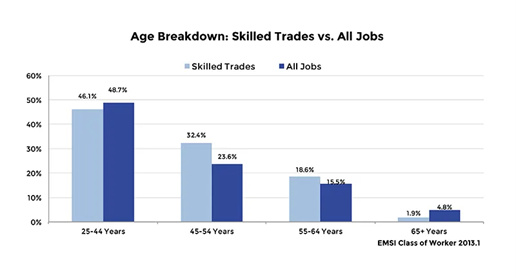Addressing the Skills Shortage: A Deep Dive into the Skilled Trades sector in the US
10 Aug, 20239:32The shortage of skilled trades workers in the United States is a growing concern for industr...

The shortage of skilled trades workers in the United States is a growing concern for industries across the country. There is already a gap in the workforce of around half a million workers in construction alone. The lack of qualified candidates entering the trades, the ageing workforce, and misconceptions about skilled trades careers have created a challenging recruiting landscape.
However, with proactive and innovative strategies, businesses can overcome the skilled trade shortage and attract top talent to fill essential roles.
Understanding the Skilled Trade Shortage
In a 2022 study by Stanley Black&Decker, 85% of young people surveyed and 94% of their parents had a favourable view of a career in skilled trades. However, less than half (49%) of those young people have ever considered a skilled trade career, and just 16% were very likely to consider a career in the industries.
Several key elements have shaped the current landscape:
Ageing workforce: The trades face a significant demographic shift, with nearly 55% of the workforce nearing retirement age. As they exit the workforce, a limited number of young people enter the trades to replace them – a figure of around 9% of the total workforce between the ages of 19-24 in the United States. This generational gap has resulted in a dwindling pool of trained and qualified tradespeople. This also means that as fewer people enter the industries, fewer people remain to train them on the job as they retire – an essential part of learning skilled trades.
Misconceptions and stigmas: Some of the misconceptions around the industry include gender imbalance and inequality, levels of education, low pay and long hours, and a lack of career advancement – misconceptions based primarily on decades-old myths. Skilled trades careers have also been undervalued and overshadowed by the emphasis on obtaining a college degree. Young people are often encouraged to chase higher salaries and better prospects from white-collar work, another misconception of skilled trades.
Lack of vocational education: The reduced school vocational education programmes have further contributed to the shortage. The focus on standardised testing and college preparation has resulted in a decline in trade-specific training opportunities for students. As a result, fewer individuals possess the necessary skills and knowledge for skilled trades positions.

Strategies to Recruit Skilled Trades Workers
Overcoming the skilled trade shortage requires a shift in recruitment approaches. Businesses must adopt proactive strategies to attract and retain top talent. Here are some effective methods to recruit skilled trades workers:
-
Emphasise the value and benefits of skilled trades careers
To combat misconceptions and stigmas surrounding skilled trades, it is crucial to highlight the value and benefits of pursuing a career in the industries. Use job postings, career pages, and social media platforms to showcase the rewarding aspects of skilled trades careers, such as competitive salaries, opportunities for career growth, and job security. Highlight success stories of individuals who have thrived in their careers, emphasising the skills and accomplishments they have gained.
-
Develop partnerships with trade schools and vocational programs
Forge relationships with local trade schools, vocational programs, and community colleges to tap into a pipeline of young talent. Collaborate with these institutions to offer internships, apprenticeships, and co-op programs. By providing hands-on training and real-world experience, businesses can attract and nurture a new generation of skilled trades workers. Additionally, sponsoring trade school scholarships or offering tuition reimbursement programs incentivises individuals to pursue trade education.
For example, StanleyBlack&Decker launched a five-year grants programme in 2021 to support nonprofit organisations delivering training and reskilling in the skilled trades industries. The organisation has pledged up to $25m in grants to fund construction and manufacturing skills programs.
-
Invest in employee development and career advancement
Demonstrate a commitment to the growth and development of your employees. Offer ongoing training programs, certifications, and opportunities for career advancement within your organisation. Create a culture that values continuous learning and provides resources for skill enhancement. By investing in your employees' professional development, you can attract and retain skilled trades workers who are motivated to grow their careers with your company.
-
Leverage digital platforms and social media
It's important to utilise digital platforms and social media to expand your reach and engage with potential candidates. Develop a strong online presence by optimising your website for search engines and promoting job openings across various job boards and social media platforms. Use targeted advertising campaigns to reach specific demographics and showcase your company's commitment to skilled trades careers. Maintain an active presence on professional networking sites to connect with skilled trades professionals and build relationships.
-
Offer competitive compensation and benefits
In a challenging, supply-led labour market, offering competitive compensation packages to attract skilled trades workers is essential. Conduct market research to ensure your salary and benefits packages align with industry standards. Additionally, consider offering attractive perks and incentives, such as flexible work schedules, performance bonuses, and comprehensive healthcare plans. A comprehensive and appealing compensation package can differentiate your company from competitors and attract top talent.
-
Develop a referral program and employee incentives
Harness the power of your current workforce by implementing a referral program. Encourage employees to refer qualified individuals for open positions and provide incentives for successful referrals. This can be in the form of monetary rewards, additional paid time off, or recognition programs. By leveraging your employees' networks, you can tap into a wider pool of potential candidates more likely to align with your company culture and values.
-
Collaborate with skilled trade staffing agencies
Partnering with skilled trade staffing agencies can streamline your recruitment efforts and provide access to a network of qualified tradespeople. Partners like NES Fircroft specialise in recruiting and placing skilled trades workers, saving you time and resources in hiring. They can help match your specific requirements with suitable candidates and handle the logistics of onboarding and employment. Collaborating with a reputable staffing agency can significantly enhance your recruitment outcomes.
-
Foster a positive company culture and workplace environment
Create a work environment that fosters a sense of belonging, respect, and inclusion. Skilled trades workers value workplaces prioritising safety, teamwork, and employee well-being. Implement safety protocols and emphasise your commitment to maintaining a safe working environment. Encourage open communication and provide opportunities for feedback and employee involvement. A positive company culture can attract and retain skilled trades workers seeking a supportive and fulfilling work environment.
-
Attend trade shows and industry events
Participate in trade shows, industry conferences, and job fairs to connect directly with skilled trades professionals. These events provide opportunities to showcase your company's projects, technologies, and job openings. Engage with attendees, network with potential candidates, and distribute informative materials about your organisation. By actively participating in industry events, you can increase your visibility and attract skilled trades workers actively seeking new opportunities.
-
Develop a long-term talent pipeline
Developing a long-term talent pipeline is essential to address the ongoing skilled trade shortage. Start building relationships with schools, trade programs, and community organisations early. Offer educational workshops, job shadowing opportunities, and mentorship programs to introduce young individuals to the trades and nurture their interests. Investing in the future workforce can ensure a steady supply of skilled trades workers for years.
Find the people you need with NES Fircroft
Overcoming the skilled trade shortage requires proactive and innovative strategies to attract and recruit top talent.
And, as the shortage of new workers has shown, the original strategies of expecting a demographic of young people to follow friends and family or actively choose skilled trades over the wealth of other options available to them no longer applies. The traditional viewpoints of skilled trades have formed misconceptions and outdated opinions of what it means to follow a trade.
By emphasising the value of skilled trades careers, developing partnerships with trade schools, investing in employee development, leveraging digital platforms, offering competitive compensation and benefits, implementing referral programs, fostering a positive company culture, attending industry events, and developing a long-term talent pipeline; businesses can overcome the challenges posed by the skilled trade shortage and secure skilled trades workers to drive their success.
It is critical for businesses to show the modern, exciting world of the industries, where highly trained teams work together with cutting-edge technology on critical projects, in safe and rewarding working conditions with great career prospects and a future-proofed vocation.
With a comprehensive and targeted approach to recruitment, companies can thrive in the competitive labour market and build a strong workforce for the future.
NES Fircroft has a network of offices spanning the United States, and recruits engineering and technical specialists for major construction and infrastructure projects across the country. Take a look at all our current construction job vacancies, or register with us to find out about the latest job opportunities as they arise.








